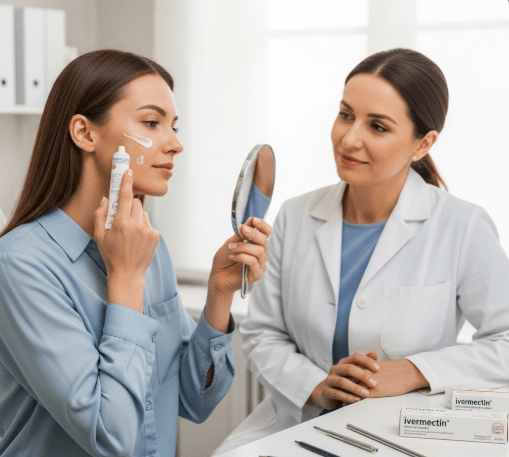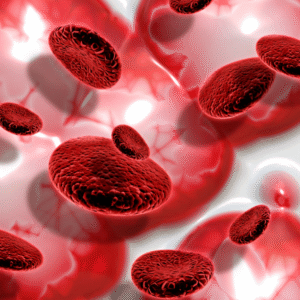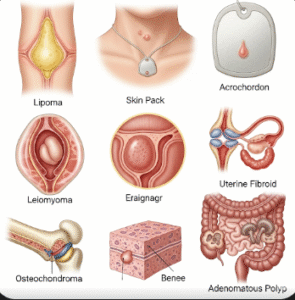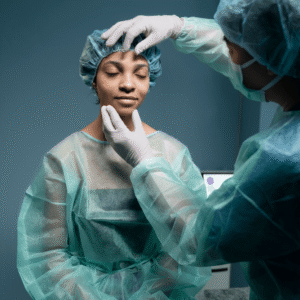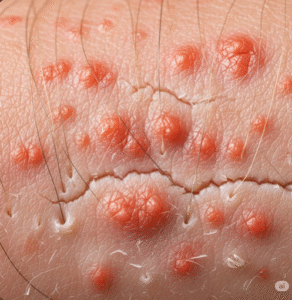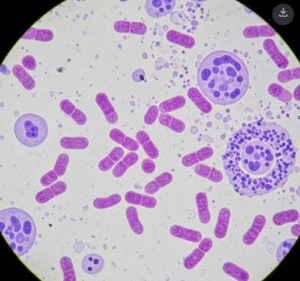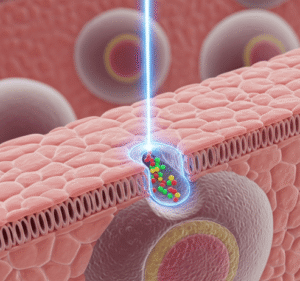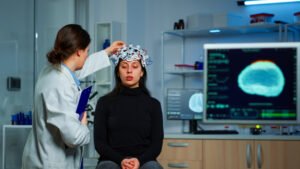What it is
Ivermectin cream therapy in Korea is a topical dermatological treatment primarily used for rosacea management, especially the papulopustular subtype, and for conditions linked to Demodex mite overgrowth.
Ivermectin is an antiparasitic agent that works by reducing Demodex mites on the skin surface while also having anti-inflammatory properties. This dual effect makes it particularly valuable in treating rosacea, where both mite density and chronic inflammation play key roles.
→ In Korea, ivermectin cream is prescribed under dermatologist supervision and is often combined with other therapies such as laser treatments, oral medications, and soothing skincare for optimal results.
• It is applied once daily to affected areas of the face.
• Korean clinics often provide customized aftercare kits with gentle cleansers and moisturizers to reduce irritation while using ivermectin.
Why it’s done
Patients in Korea use ivermectin cream therapy for several reasons:
→ Rosacea treatment: Particularly effective for papulopustular rosacea with inflammatory bumps and redness.
→ Demodex management: Reduces mite populations, which are often higher in rosacea patients.
→ Inflammation control: Helps calm skin sensitivity and prevent flare-ups.
→ Alternative to antibiotics: Provides an option for patients who cannot tolerate or wish to avoid oral antibiotics.
→ Aesthetic improvement: Reduces visible redness and pustules, improving skin clarity and texture.
Alternatives
Other topical treatments for rosacea and Demodex management include:
• Metronidazole gel/cream → Anti-inflammatory but less effective for mites.
• Azelaic acid → Reduces redness and bumps but may cause stinging in sensitive skin.
• Sulfur-based creams → Effective against mites but may cause dryness and odor.
• Oral doxycycline → Used for anti-inflammatory benefits but carries systemic side effects.
→ Compared to these, ivermectin cream is unique because it addresses both Demodex and inflammation simultaneously.
Preparation
Before starting ivermectin cream therapy in Korea, patients undergo preparation:
- Dermatology consultation → Confirms diagnosis of rosacea or Demodex-related skin issues.
- Skin evaluation → Identifies sensitivity, severity, and potential allergies.
- Stop harsh skincare → Retinoids, strong acids, and exfoliants are discontinued before therapy.
- Sun protection → SPF use is emphasized, as rosacea-prone skin is UV-sensitive.
→ In Korea, patients are often given a starter skincare routine with calming, barrier-repair products to prepare the skin.
How it’s done
Ivermectin cream therapy in Korea follows a structured approach:
- Application frequency → Typically once daily, applied as a thin layer on affected areas (cheeks, chin, nose, forehead).
- Duration → Standard courses last 8–12 weeks, with ongoing use for maintenance if needed.
- Combination therapy
- May be paired with laser treatments (V-beam, IPL) for redness.
- Sometimes combined with oral doxycycline for severe cases.
- Integrated with Korean skincare products (centella, panthenol, ceramides) to support the skin barrier.
- Patient education → Dermatologists instruct patients not to overuse the cream, as excessive application can cause dryness.
→ Noticeable improvement often occurs by week 4–6, with maximum results after 12 weeks.
Recovery
Recovery while using ivermectin cream is gradual but steady:
• Short-term → Mild dryness or stinging may occur in the first week.
• Medium-term → Redness and bumps begin to reduce after 4–6 weeks.
• Long-term → By 3 months, many patients achieve clearer skin with reduced sensitivity.
→ Maintenance use may be recommended to prevent relapses.
Complication
While generally safe, ivermectin cream therapy may have potential side effects:
- Skin dryness or irritation → Especially in the first few weeks.
- Temporary flare-ups → Rare initial worsening as mites die off.
- Allergic reaction → Uncommon but possible with itching, rash, or burning.
- Incomplete results → Some patients may require additional therapies for full control.
→ In Korea, dermatologists closely monitor patients to adjust treatment and minimize complications.
Treatment option in Korea
Korea provides some of the most comprehensive ivermectin cream therapy programs worldwide:
→ Dermatology expertise → Korean specialists often combine ivermectin with vascular laser therapy for rosacea patients, addressing both redness and inflammation.
→ Skincare integration → Korean aftercare kits typically include centella asiatica, hyaluronic acid, and calming moisturizers to complement ivermectin.
• Combination care → Ivermectin is often used alongside oral doxycycline or azelaic acid for resistant rosacea.
• Ocular rosacea care → For patients with eyelid Demodex, referrals to ophthalmologists are made, integrating ivermectin with eyelid hygiene.
• Medical tourism → International patients frequently choose Korea for rosacea management, appreciating the precision and cosmetic focus of treatments.
→ With its dual anti-mite and anti-inflammatory properties, ivermectin cream therapy in Korea is considered one of the most effective and safe first-line options for managing rosacea and Demodex-related conditions.

